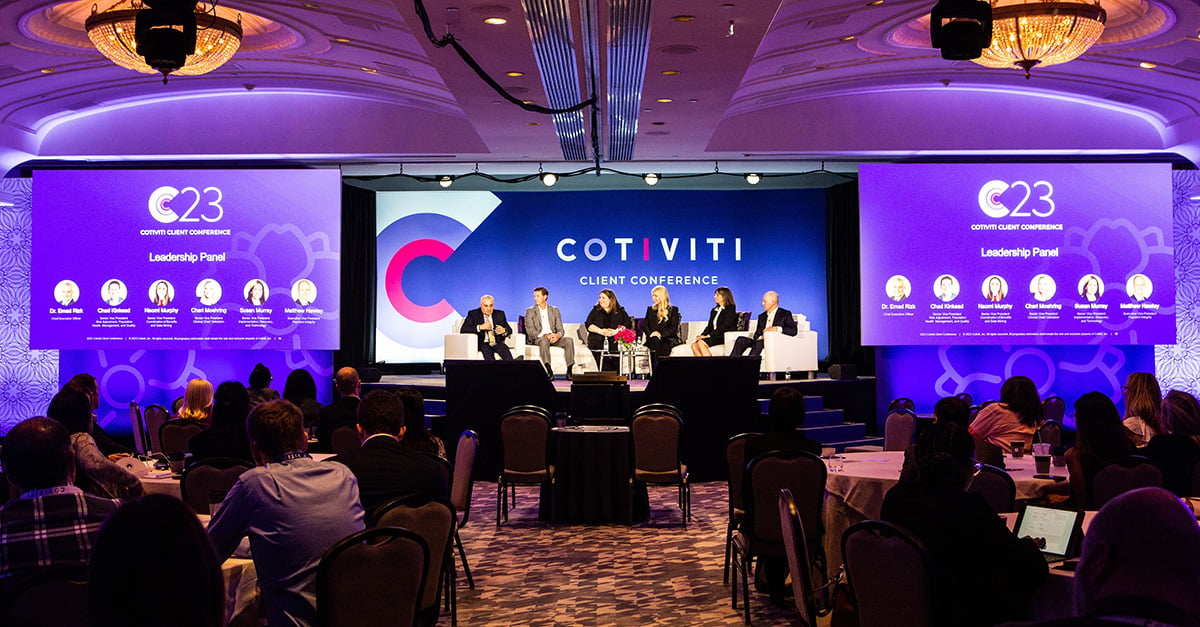The 2023 Cotiviti Client Conference (CCC23) held earlier this month in San Diego brought together more than 120 health plan leaders to share ideas for improving the quality and sustainability of healthcare delivery in the United States. With the theme of “collaborating for success,” attendees discussed critical topics ranging from how the end of the COVID-19 Public Health Emergency will impact Medicaid members to the use of artificial intelligence and natural language processing in a wide array of healthcare applications. The event served as a forum to share challenges and success stories in driving incremental improvement in our healthcare system.
In payment integrity specifically, health plan leaders discussed topics including how to improve inpatient claim reviews; prevent fraud, waste, and abuse in emerging areas such as genetic testing; and driving more targeted medical chart selection for better efficiency and lower provider abrasion. Here are three major takeaways from the conference aimed at improving payment integrity without negatively impacting either the provider or member experience.
A commitment to precision and accuracy in payment integrity reduces abrasion
All health plans want to identify and correct inappropriate claims sooner in the payment process and reduce the need for costly and abrasive overpayment recoveries. Amid significant technological progress, areas such as DRG claim review and coordination of benefits, which have traditionally been performed only after claims have already been paid, are increasingly shifting to prepay for greater efficiency.
But the postpay to prepay shift can’t be achieved at a cost to precision and accuracy, or plans will risk significant provider and member abrasion. For example, when requesting medical records to validate claims before payment, instead of casting a wide net, health plans should lean on technologies such as machine learning to target records with the highest probability of being billed inaccurately and returning value to the plan. In coordination of benefits, health plans should consider events in the member’s lifecycle (e.g., marriage, divorce, or gain of employment) to reduce the amount of member contact needed and help ensure that benefit determinations are made correctly. While postpayment integrity will always be vital, health plans can thoughtfully shift a significant amount of payment integrity work forward in the claims payment continuum while actually improving provider and member relations, not hurting them.
An enterprise-level partner improves speed to value
Every moment counts in prepay integrity as health plans seek to pay claims appropriately within prompt pay deadlines. As the clock ticks, plans can’t wait months for a medical record to come in for their nurse coders to perform a chart review. This is where an enterprise partner with a proven, scalable process for retrieving records for a wide range of purposes, including payment integrity, risk adjustment, and quality measurement, becomes vital.
Rather than onboarding a separate vendor focused solely on chart retrieval, Cotiviti’s health plan customers can improve efficiency by deploying the expertise of their existing payment integrity partner to achieve retrieval rates exceeding 90%, with more than 80% of records secured within 45 days.
For some outpatient and inpatient facility claims, plans can even look to bypass the need for chart retrieval altogether by leveraging cross-claim clinical review to catch mismatched diagnoses while still achieving a comprehensive picture of the member’s clinical journey. This achieves the same result as if the plan had requested the medical record while accelerating speed to value and reducing the potential for abrasion.
Constant innovation and evolution is paramount
As competition among health plans continues to increase and patients look to nontraditional venues such as big box retailers to meet their immediate care needs, payer executives know they need to move beyond “table stakes” in payment integrity such as editing outpatient and professional claims. That’s why health plans are increasingly looking to tackle more difficult and costly areas of claim spend such as inpatient and pharmacy costs. By deploying innovative “pause-and-pay” interventions that enable claims to be corrected before payment rather than simply denied, health plans can meet prompt pay deadlines while increasing performance.
A large-scale partner can also deliver innovation by leveraging insights gleaned across data from multiple payers—such as the more than 80 billion claim lines analyzed by Cotiviti’s solutions each year. These insights help Cotiviti quantify the value of undeployed payment policies and make personalized payment policy recommendations for our clients.
Achieving incremental value together
Instead of making generic recommendations, Cotiviti seeks to meet our health plan customers where they are and help them take the next best action to improve value. As Healthcare Leadership Council President Mary R. Grealy explained at the conference, healthcare progress can often be achieved most successfully by focusing on the “small ball” opportunities instead of large-scale wins. We look forward to working closely with our customers to implement the solutions we discussed at CCC23 and help them deliver care at lower cost through advanced technology, data analytics, and specialized expertise.
Adjudicating claims appropriately while minimizing the need to pursue overpayment recovery remains one of the greatest challenges faced by all payers. While many players in the payment integrity space offer software that enables health plans to manage their prepay claim editing of professional and outpatient facility claims, this approach only tackles one aspect of the payer’s entire claim stream and the payment integrity continuum.
Read the new white paper from Cotiviti, a payment integrity partner to more than 100 health plans, as we break down:
- The value of a managed service model versus a software-only approach
- The five critical dimensions of any payment integrity program
- The role of artificial intelligence in payment integrity






